
Netgear Nighthawk Mesh Wifi 6 Review

Netgear Nighthawk Tri-Band Mesh Wifi 6 System 3.6Gbps Router + 2 Satellites With
Brand New

Micro Center Return Policy:
You can be sure of your satisfaction with every item we sell. We offer a complete refund without a receipt. Micro Center wants you to be happy with every purchase. We are here to help you if you have any questions or wish to return an item.
If an item you have purchased from us is not working as expected, please visit one of our in-store Knowledge Experts for free help, where they can solve your problem or even exchange the item for a product that better suits your needs.
If you need to return an item, simply bring it back to any Micro Center store for a full refund or exchange.
*If you are a Micro Center Insider or if you have provided us with validated contact information (name, address, email address), you won’t even need your receipt.
Key Specifications
- Review price: $229.99
- 2×2 2.4GHz (1200Mbps)
- 2×2 5GHz (2400Mbps)
- Wi-Fi mesh 6
- One Gigabit Ethernet port per satellite
- Gigabit Ethernet WAN
When they first started to appear, Wi-Fi 6 routers were exceptionally expensive, and mesh systems even more so. Recent months have seen prices drop, and now the Netgear Nighthawk Mesh WiFi 6 System is the cheapest that we’ve seen, approaching levels of Wi-Fi 5 models.
Decent performance with the right setup can make this a bargain, although it’s a very basic mesh system lacking many of the more advanced features that other mesh systems have.
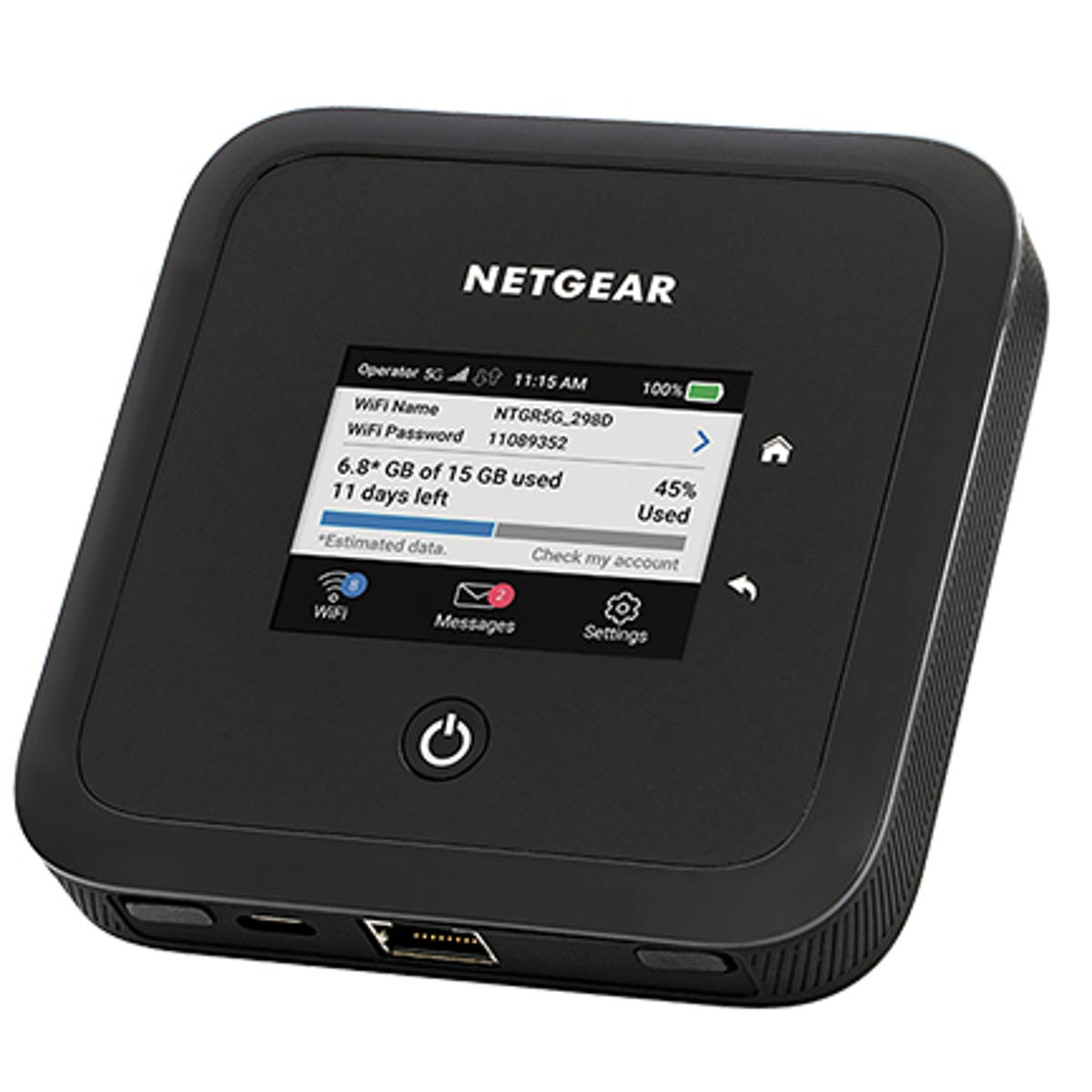
Which are the Best Wi-Fi Routers 6?
The Asus RT-886U is Wi-Fi 6’s best router. It can connect to a variety of devices and provide gaming performance comparable to dedicated routers.
For unbeatable performance, the hands down leader is the Netgear Nighthawk RAXE500, which uses the new Wi-Fi 6e standard to offer incredible speeds of nearly 2.5 Gbps. You’ll pay a lot for that performance, but if you want the undisputed performance champ, this is it.
The Netgear Orbi WiFi 6E (RBK963) is the best mesh system to get the newest standard, combining the well-loved Orbi’s ease of use with even better performance. We were impressed by the quality of this mesh system, and also shocked at its price. You can also choose the less-expensive Netgear Orbi WiFi 6, (RBK852), which uses standard Wi-Fi 6.
Security
The AX3600 does support WPA-3, the latest encryption standard, which is becoming increasingly important as all the previous standards have been cracked at this point.
The AX3600 does support network level antimalware security, which is termed “Netgear Armor” here. But while there is a free trial, it’s limited to 30 days, even on this top end mesh kit. Beyond that, you’re looking at an annual subscription for an additional cost of $69.99 (although it’s currently on sale for less). Purchasers should factor this into the cost of the AX3600, because some competing products have network-level antivirus for the life of the product without an additional cost.
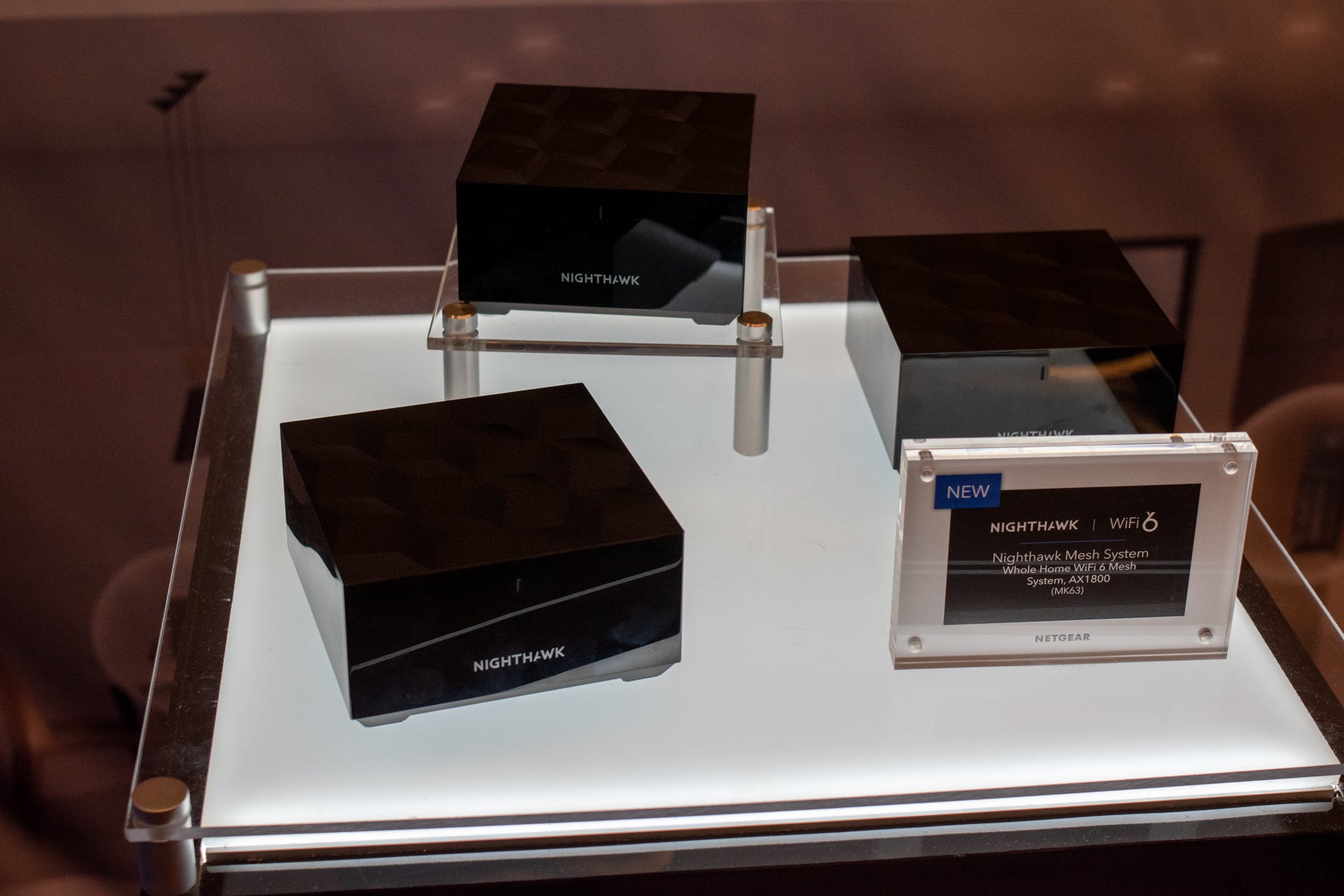
Mostly Stable Network
After stopping dealing with the Chromecast that does not work, the home network has been stable ever since I updated the firmware on the Netgear Nighthawk MK63. Admittedly, the speed is not experienced better than the Google Nest Wifi network I had before.
But I experience the stability as better now, with the latest firmware. The exception is the Google products mentioned above, which worked much more reliably in the Google network. But other products are more stable now, and I have not had to restart the network for a long time. And it is quite unusual, because almost no matter where I have lived or what kind of network I have had, a restart on the home network has been something you have to cover at least once a month.
The solution
Things got much better after updating to the most recent firmware. Suddenly I got the surveillance camera (Arlo Q) up and running, the robot vacuum cleaner (iRobot Roomba 980) has worked like a clock since, and I can control the garage door and sunshades without any problems. PC and mobile online is now also far more stable than in the beginning, and my Wi-Fi 6-compatible iPhone 11 Pro Max has a nice stable speed (approx. 100-200 Mbit/s in close proximity of each node and substantially closer to Nighthawk router (575 Mbps). I get about the same speeds on my PC with Wi-Fi 6 cards.
Everything from streaming, whether it is film, music or games – and regardless of resolution – works smoothly on the new mesh network. No problem.

Productname: What You Won’T Like
As always, the Nighthawk software is functional and has plenty of features for most people. Still, it feels dated and oversimplified compared to something from Asus or TP-Link. Although you can quickly find the majority of your desired settings, it is not easy to locate more complex options. The Nighthawk app is also less refined than its competitors.
Naturally, I completed all of my testing with the most up-to-date firmware and app version at the time of writing. It was not possible for me to view the device list of a particular node during my testing. Some elements, such as Netgear Armor’s vulnerability page take a lot of time to load. It is also on an extremely fast Galaxy S20+. These minor issues will likely be ironed out in time with updates to the platform and app, but it feels out of place in such an expensive kit.
Nighthawk feels outdated and simplified compared with the rest of its competitors.
Netgear Armor, which includes Bitdefender threat detection and Bitdefender software for protecting you while on the move is an impressive product. Notifications of any new connections to your device are also sent. Armor protects against known fraud sites and online attacks such as DDoS. It can also prevent data being transmitted over unsecure connections. It costs $70 annually and cannot be billed monthly. Luckily, you get a 30-day trial to figure out if you want it.
For the price, this router could also stand to be a bit faster. The MK83 does not support 160MHz and has one dedicated band for the mesh link. As such, your devices will experience a much more similar interface to AX1800 routers. This means that Wi-Fi 6 devices can only connect at 1201Mbps and Wi-Fi 5 users are limited to 867Mbps. While this is fine for most people, you won’t be making the most of faster devices like the Galaxy S21 Ultra or even a fast laptop like an Intel MacBook Pro.
The expansion is the last thing you should remember before purchasing this kit. While the included nodes will easily cover most homes, any further expansion can be a bit complicated. You can expand your mesh with either an MS80 satellite or an MS60. These are both part of Wi-Fi 6 Nighthawk’s mesh line. Keep in mind that the MS60 is only a dual-band AX1800 satellite. For example, you cannot buy two MK83 kit and combine them. You could use the two satellites, but you would be leaving one of the MR80 routers in the box.
Netgear Nighthawk Model Mk83: The Things You Like
The Netgear Nighthawk MK83 comes with three nodes, a router, and two satellites. Each unit is equipped with tri-band Wi-Fi 6 capabilities at AX3600 speeds. That breaks down to 600Mbps at 2.4GHz, 1201Mbps at 5GHz, and 1800Mbps at 5GHz. This faster connection uses the 5GHz band to connect satellites and share device connections duty. This is one of best Wi-Fi mesh routers 6 you can buy.
Like most Netgear mesh solutions, this setup is designed to ensure consistency and not speed. The maximum speed at which devices can connect to the network is 1201Mbps over Wi-Fi 6, and 867Mbps via Wi-Fi 5, respectively. Using the fastest band for the mesh connection makes a lot of sense so that the mesh can handle a large number of satellites, each with dozens of connections.
This is all accomplished in a fairly compact housing measuring just over five inches on each side. Although it is not the most compact mesh network, dual Ethernet ports are included on satellites and three on router. This makes the system very adaptable for wired homes. These nodes also have great coverage with 2,250 square feet per satellite. The entire system adds up to 6,750 square feet of coverage.
While the raw square feet figure is huge, keep in mind that things like walls, HVAC units, and appliances can severely impact your coverage, so plan to overbuy on your mesh system a bit. The Nighthawk app will allow you to view your satellite’s connectivity quality and provide guidance on how to position them.
I tested this system with only one connected satellite, as my home isn’t big enough to effectively use both. My internet connection is up to 940Mbps down, and this mesh didn’t quite keep up with the full speed but got close enough that I didn’t notice outside of a speed test. Because settings are very limited, I was unable to separate bands and test them individually. To ensure that the system connects to its best node, I tested each wireless device at each site.
Nighthawk MK83 Speed Tests (80MHz @ 5GHz)
This connection worked well for most of the time. Oddly I found that my speeds connected to the node were higher than when I was right next to the main router. I believe this is due to less congestion in that part of my apartment. The satellite was connected to an Ethernet cable and the results were between 600Mbps and 900Mbps.
One odd result was recorded by the Galaxy S20+ at 140Mbps. The device likely was still on the 2.4GHz band when it switched to 5GHz. All Netgear mesh systems use Smart Connect, which automatically chooses the best band for your device with a single Wi-Fi name and password. It took only a few minutes for the device to be properly assigned, and it is now working correctly.
The way Netgear builds its mesh systems is a bit different from its competitors in that each system has a single router with satellites. You can’t swap them around and can’t use routers as satellites.
Satellites and routers cannot be switched around. You can also not use satellites as routers.
Satellites in this package have identical hardware specifications to the main router, with one less Ethernet LAN port. Also, there are no USB ports anywhere on this kit. Satellites can connect through other satellites, so coverage works like most other mesh systems, but expansion isn’t quite as simple. Netgear also has an MK84 package with three satellites and the option to purchase more separately.
Netgear Smart Parental Controls is one of its most distinctive features. You can set broad controls for the entire network or set restrictions for specific family members.
Source: Samuel Contreras / Android Central
Netgear’s Smart Parental Controls are great. While the cost of $7.99 per month or $69.99 per year is a bit steep, this software has everything you expect with easy site blocking, scheduling with rewards, and great device controls.
Source: Samuel Contreras / Android Central
Netgear also includes My Time for compatible devices. This allows you to maintain your parental control settings even if your child connects to another network.

Settings
You can fine tune your network through your browser if you wish. Here you choose whether the router should be just a router or an access point (AP mode). Select this if the network is unstable when connected to another router in the house. Here you also select the password, whether you want to set up a guest network, whether you want to broadcast on another channel or whether you want to amplify or weaken the signals.
It isn’t always a good idea to transmit at maximum power if nodes are too near each other or cause interference. It works fine as long as you don’t touch the settings.
Real-World Speed Tests Were A Real Pain
After our laboratory tests were completed, it was now time for the Nighthawk to be taken home and tested in real life. ft. shotgun house in Louisville, KY. It’s a relatively small space for a mesh system, but it gives me a good chance to see how these systems actually perform in a home environment.
In this case, it’s where things sort of fell apart.
Are you getting speeds below 100 Mb/s on a connection of 300 Mb? That’s the router in the background, a few feet away…
At first, everything seemed fine. The Nighthawk app from Netgear guided me through setting up my network and I was online in no time. My first few speed tests, conducted from the comfort of my living room couch with the router sitting just a few feet away, were just as fast as you’d expect, essentially maxing out my home’s 300 Mbps fiber internet plan.
But then I picked up my laptop and moved to a new spot — the kitchen. Although it is a little further away from my router, the kitchen has an open floorplan and connects to the living area. There are no walls. My speeds dropped to below 100 Mbps.
This was, of course, strange. And, when I see a weirdly slow result like that in my tests, I’ll make a note of it in my spreadsheet, then reset the connection. That did the trick — after disconnecting from the network and then reconnecting to it, my speeds were back up were they should be, just shy of 300 Mbps.
It happened again. It happened again. And again. I’d move to a new spot during my tests, and my speeds would nosedive. I alternate rounds of speed tests from the front of the house to the back, and then from the back of the house to the front — on one of the latter rounds, where that close-range living room test is the last test in the sequence, my speed came in at 93 Mbps. That was with the router only a couple of feet away.
In the end, the Nighthawk returned an overall average speed of 219 Mbps throughout my whole house, which is worse than all but two of the dozen or so systems I’ve tested in my home, Wi-Fi 6 or otherwise. This was despite me constantly re-connecting to ensure the system’s best possible success.
Slow speeds in my kitchen one minute, then back to normal as soon as I disconnect and reconnect.
So what was happening here? It wasn’t my network — I made sure to run some control tests with my existing router, and didn’t see anything like I was experiencing with the Nighthawk. The online speed testing software I used and the server that I connected to did not register any problems when tested with my router. In fact, I’ve run thousands of speed tests in my home over the past several months under the same controlled settings, and the Nighthawk is the only router that’s given me this much of a headache.
It really seems like the Nighthawk, for whatever reason, isn’t all that good at optimizing the signal for a client device that isn’t in a fixed location. The connection can get confused if the device is moving from one place to another. This causes problems and slows down. It could be poor beamforming, or an inept mesh algorithm that doesn’t know when the satellite will route the connection. However, whatever the reason, this is something I don’t like to have to worry about at home.
I’ll also note that it isn’t the first time that I’ve had issues with Netgear’s mesh performance. During my home tests, both the dual-band Orbi Voice Wi Fi 5 and triband Orbi Voice Wi Fi 5 dropped my connection multiple times. Only the high-end, Wi-Fi 6 version of the Netgear Orbi managed to impress me with the stability of its signal.
Although the Nighthawk had a signal strength that was slightly higher than comparable Wi-Fi 5 systems like the Nest Wifi and Netgear Orbi 6 systems, it wasn’t nearly as strong.
We also test for signal strength. We move to the 5,800 square feet. CNET Smart Homes, which is approximately 5,800 sq. ft. We set up each mesh system with the routers and satellites at opposite ends of the main floor. Then, we use NetSpot’s online software to track how strong the connection is across dozens of locations. It’s a bit of a stress test — the two-piece Nighthawk system is designed for homes of up to 3,000 square feet.
These results are very similar to those you would expect from an entry-level WiFi 6 system such as the Nighthawk. The signal strength on both the main floor where the router and satellite were located and the basement level below was adequate and slightly stronger than a comparably priced Wi-Fi 5 system like the Nest Wifi, but not nearly as strong as a high-end, triband Wi-Fi 6 system like the Orbi 6 that sells for $700. The Nighthawk is credited with finding a middle ground, particularly considering that it’s less expensive than the Nest.
The Nighthawk still managed to reach speeds of around 40% at the longest distances tested in our laboratory and a mere 30% at home. These are the lowest-end Wi-Fi mesh system results I have tested.
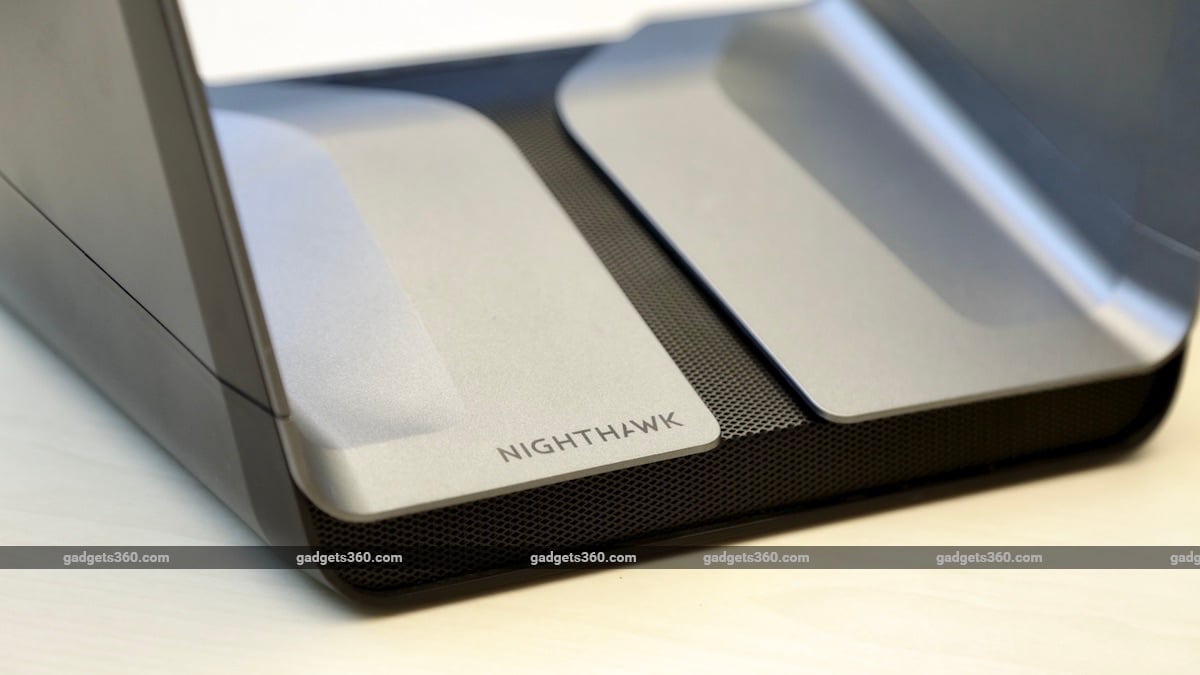
Initial impression is unsteady
With the original firmware, life with the Nighthawk MK63 was anything but a dance on roses. The products would not connect and were rarely stable. Getting the many Google Home speakers to connect, not to mention working normally with the Home app on your mobile, was almost impossible to forget. It was the same for a pair Chromecast dongles, which are attached to their dumb old TVs. The home network had to be restarted almost every day, which was something I wasn’t willing to do.
Before I updated the driver, my laptop couldn’t even recognize the new network.
Netgear Nighthawk Mesh Wifi 6 System Features – Extremely Basic But Simple To Setup
You need the Nighthawk app to set up the system. As there’s a default, secure wireless network out of the box, it doesn’t take long to run through the wizard and connect the system to your internet connection. You can also configure your network details using the wizard, rather than sticking with default settings.
Satellites come pre-paired, so you just need to turn them on at the right time and they’ll connect automatically. The status light at the satellite’s front shows the signal strength. A strong blue light indicates that the satellites are connected to the router. Annoyingly, these lights don’t turn off automatically and there’s no way to turn them off in the app, either.
You’ll be amazed at how basic the system looks once it is operational. The Nighthawk system, unlike the Netgear Orbi, doesn’t have any security system built in, nor does it have any parental controls. It is possible to view all connected devices, pause those you do not want and to resend them.
You can speed-test the internet connection using the app. However, this won’t tell you how fast it is. Open up the web interface, and you can also turn on QoS, which uses your internet speed to automatically ensure that no one client can leach your entire bandwidth.
From the web interface, you get a few more advanced features too. You have the ability to set up the wireless channel manually on both 5GHz and 2.4GHz networks. You also can enable port forwarding and turn on BT IGMP Support. This is necessary if you wish to stream BT TV YouView channels. This is all there is to it. You can get more features by purchasing a mesh system.

You Can’t Split 4 and 5 Ghz
I have no idea why there are problems with some Google products, they support both 2.4 and 5 GHz. My theory is that the Google products don’t see the 5 GHz spectrum and connect to 2.4 GHz. There is no possibility of splitting the two bands, even in advanced wi-fi settings on the router. There is no way I can force my iPhone into 2.4GHz.
I also have a 1st generation Google Home Mini speaker, which refuses to stay stable on the Nighthawk network. I solved this with a cheap Wi-Fi extension (TP-Link RE200) which took the baton further from the Netgear network. It has not cheated ever since, thanks to the extension’s speaker.
The Power Of The Dark Side
If the Nighthawk mesh router looks a little familiar, that’s because it’s the same basic design as the recent dual-band, budget-priced version of the Netgear Orbi mesh system, which I reviewed a few months ago. Nighthawk uses the same basic boxy design with heat vents that look like cheese grater-types, paints it black and puts a Nighthawk label at its front. It also supports Wi-Fi 6.
Both the router and the satellite include one spare gigabit Ethernet jack, which lets you wire the two together for faster system performance.
I liked the small, unassuming design quite a bit back when I reviewed the Orbi, and I think it works well here, too. It’s good-looking without drawing too much attention to itself, and does a good enough job of blending in that you won’t feel embarrassed about keeping both devices out in the open, where they’ll perform their best.
Another design improvement to note is that Nighthawk’s mesh system includes an additional Ethernet jack at the satellite’s back. This feature is not available in the dual-band Orbi mesh systems. This is useful if you need a wired connection between your router and satellite to speed up system performance or to connect something such as a media streamer to the satellite.
The Nighthawk router is dual-band AX1800. It supports Wi-Fi 6, 802.11ax, and 1800, respectively. As always, combined speed ratings like those are a bit misleading since you can only connect to one band at a time. Netgear states that speeds up to 600Mbps can be achieved in the 2.4GHz band, while speeds at the 5GHz band are as high as 1,200Mbps.
Expensive, triband Wi-Fi 6 mesh routers like Netgear’s Orbi 6, the AmpliFi Alien and the Arris Surfboard Max Pro all averaged faster top speeds across all distances — but at a distance of five feet (blue), the Netgear Nighthawk was actually the fastest mesh router we’ve tested yet.
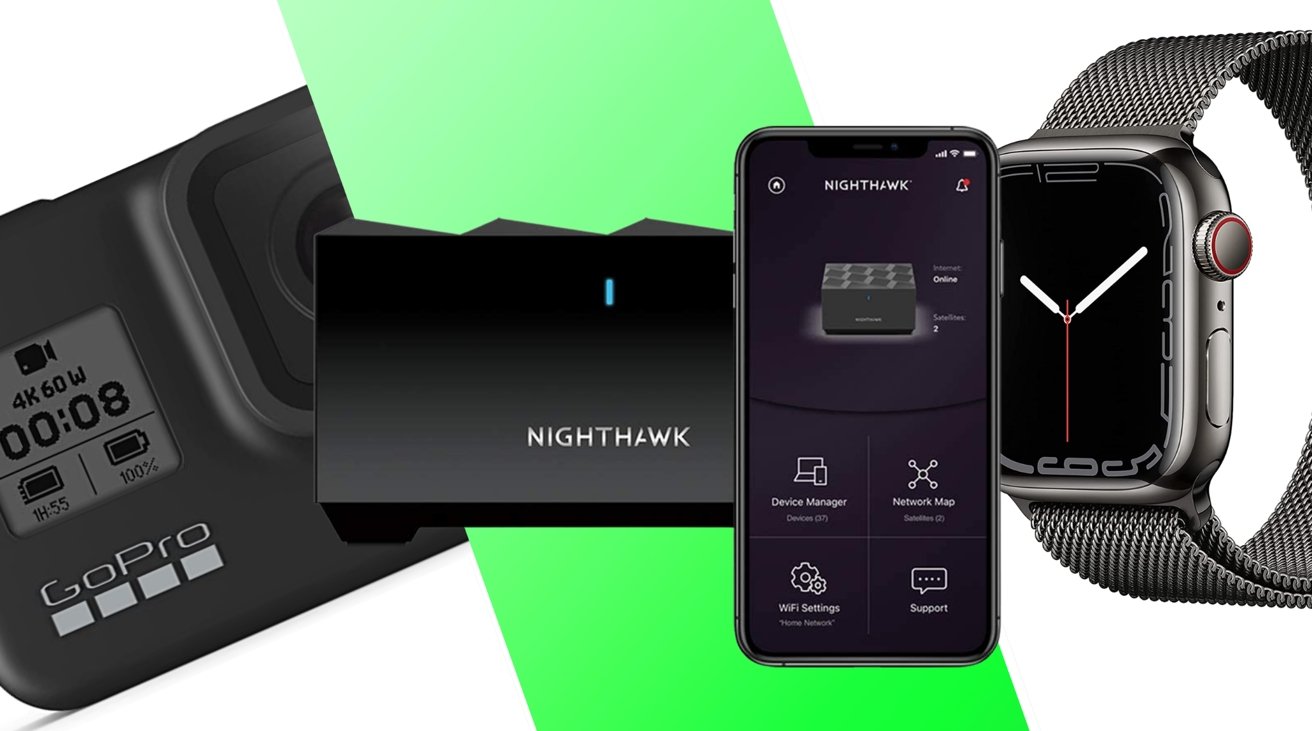
Conclusion
I am very pleased with the stability of one of the market’s most affordable Wi-Fi 6 mesh networks. The speed is also good on the Netgear Nighthawk MK63, but not much better than the best Wi-Fi 5 networks in my experience. In other words, do not expect to see the network speedometer slam up to 1 Gbit / s on wireless. However, more connected devices will be handled by the network to some degree.
If you absolutely must have the roughest speeds, mesh may not be the way to go, this is first and foremost convenience for people who do not want to manually connect from router to router depending on which room they are in, but just want a network that works throughout the house. And for this purpose, the Nighthawk MK63 works well.
Not all products are equally happy with this network, among other things we had some problems with some Google gadgets we could well have been without. This should improve with the next firmware upgrade.
Ethernet connection
Nighthawk nodes are different from other mesh networks. They have an Ethernet connection so products without wi-fi may also connect to the network. You can also connect a cable to get faster internet speed if your PC is in the same space as the Nodes.
:max_bytes(150000):strip_icc():gifv()/hero-4043312-1-5c923db7c9e77c0001ff0bb3.jpg)
Netgear Nighthawk Wifi 6: The Verdict
Netgear Nighthawk Mesh WiFi should, on paper, do exactly what it claims – provide faster and more reliable connections. You get automatic channel selection, up to 420 square metres of coverage, dual band with auto-select, and setting up through the app is a breeze. Though unfortunately, for the most part I ended up better off just sticking to 5Ghz channel on a TPG modem.
Netgear Nighthawk Mk83: Price And Availability
Nighthawk MK83 can be purchased in Canada and the U.S. for CA$599.99 and $499.99 respectively. The Nighthawk MK83 was first made available to the public in March 2021. It can also be purchased for as little as $400. If you want to extend your system, additional MS80 satellites are available at $199.99 per piece. The system, by default, comes with two MS80 satellites and an MR80 router which is more than enough coverage for most homes.

For Gigabit Internet, Stay Ahead of the Curve
The ZenWiFi AX (XT8) is almost a clone of our CT8 pick, but with significant upgrades in the form of future-proof technologies like Wi-Fi 6 and WPA3. It is recommended only if your internet provider offers gigabit (1,005 Mbps) or similar service.
Not As Fast As More Expensive Wi-Fi 6
As I said, I experienced speeds equivalent to a good AC network. However, it also provides greater stability which is crucial if there are many devices connected to your home network. The Netgear Orbi RBK752 mesh system is also available, but it’s more costly than the Nighthawk MK63.
The nodes in a mesh network are usually the weakest links. They always provide slower speeds than the main router. The nodes of the Nighthawk MK63 provide about half the speed of the nodes of the Orbi network. The router, on the other hand, has about the same speed from both.
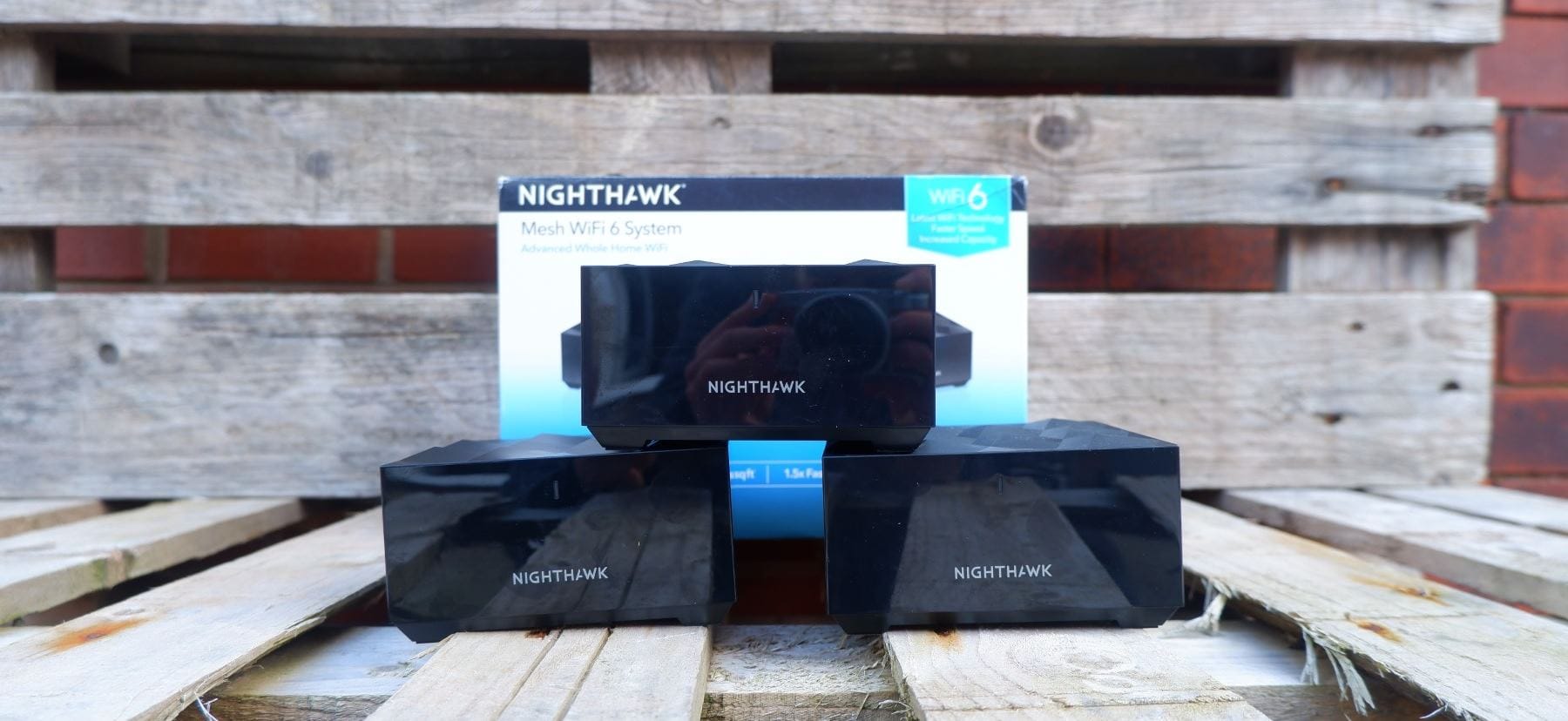
Need Help? Don’T See What You Are Looking For?
Please let us know, and we will get to work on your favourite product or category within the shortest time possible. Let us assist you in your search on Amazon.
Software
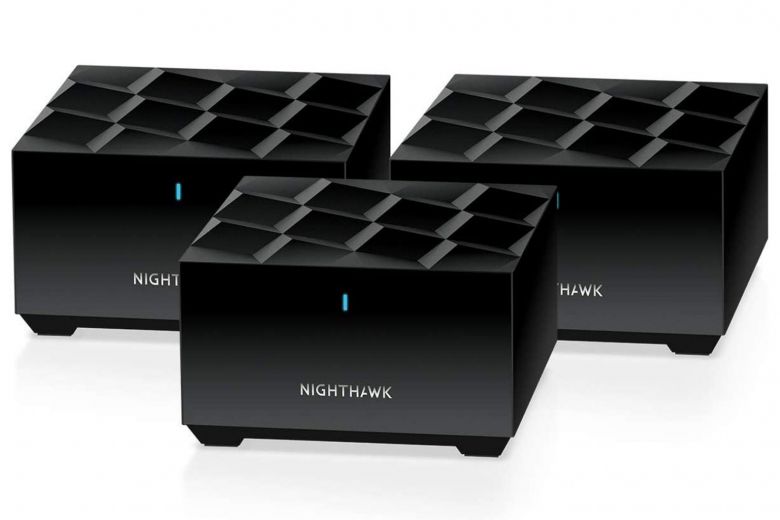
Bad Stuff
- It is expensive
- A paid subscription locks out parental controls
- Speeds are only slightly faster than Wi-Fi 5 systems
- Few advanced features and limited control options
- Just two Ethernet ports on each node
Eero Pro6 App and Setup
Setting up the Eero Pro 6 is just as easy and straightforward as the company’s prior models. You download the app to your phone, plug in the first node, and follow the prompts. The app walks you through adding the additional nodes, creating your network and password, and turning on features such as a guest network or Eero’s subscription-based security and parental control features.
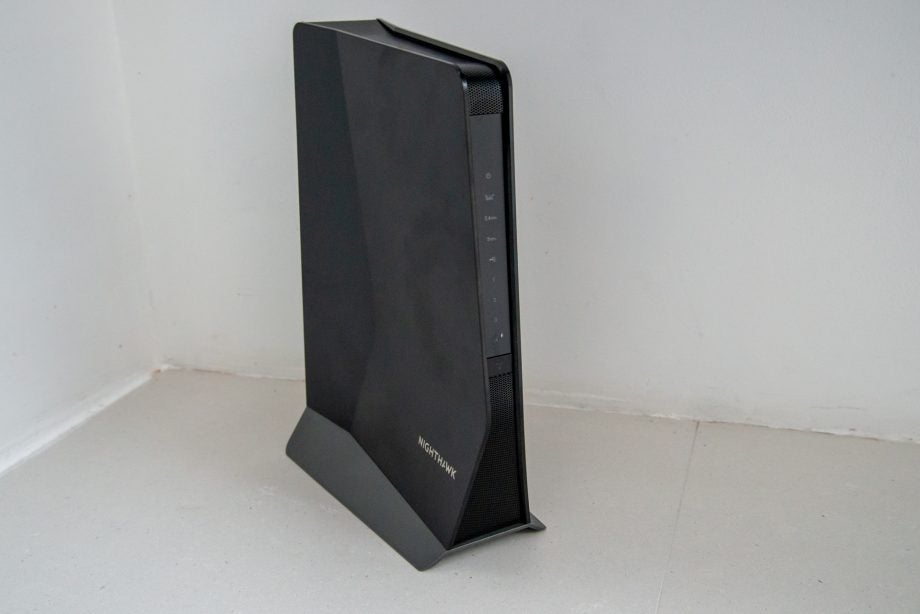
The Things We Really Love
- Painless set-up through the app
- The design looks like something out of a villain’s lair.
- Heaps of data available on the app
Netgear Nighthawk Mesh Wifi 6 Review
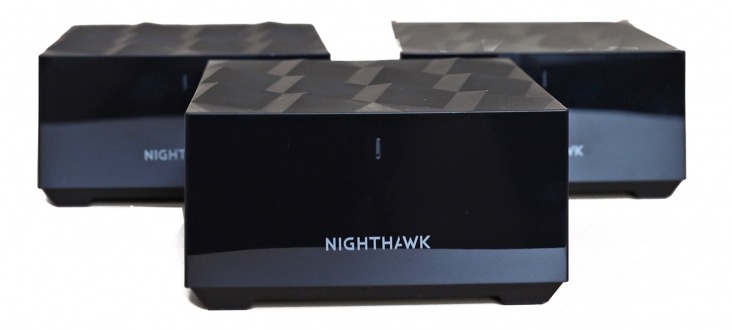
Design & build
The Nighthawk Mesh WiFi 6 System units are sturdy-looking reflective black mesas with snazzy angular undulating designs on the top. The look and colour scheme is consistent with Netgear’s gaming-centric brand of routers, though there are no large posable antennas jutting out at the sides – all of the radios are neatly tucked away and hidden inside the 122 x 122 x 64mm plastic bodies.
Three-unit packs were tested for me, one router and two Satellites. The MR60 router and satellite are almost identical in terms of appearance and specs. However, there is one major difference: the MR60 router comes with two gigabit Ethernet ports – one for connecting to your modem and one to connect other devices.
It doesn’t provide much in terms of wired connectivity – the Eero provides two Ethernet ports per item. They’re not as small as the Eero units either, which measure a dinky 60 x 98 x 98mm. The lack of ports means that you’ll likely want to invest in a network switch, especially if you have lots of devices with Ethernet ports in your living room.
The Mesh WiFi 6 units weigh in at 287g. They can be placed on desktops or window sills and moved around easily.

Cons
– Recommended for larger homes than 2000 sq.ft
Although you can’t purchase the Nighthawk MK63 Mesh System directly from Netgear (or AU$649), it is possible to find the MK63 online for around PS300.
Netgear Nighthawk MK63, a 3-piece mesh router system with Wi-Fi 6, is composed of a primary router as well as two secondary “satellites”. The MK63 is designed to cover homes up to 3500 square feet. However, a two-piece MK62 kit, which costs less, will work well for smaller homes up to 2000 square feet.
Wireless connectivity: WiFi 6 (IEEE 8002.11ax), dual band 2.4GHz/5GHz Processors: 1.5GHz, quad core Storage: 128MB Flash beamforming: Explicit to 2.4GHz/5GHz ports: Satellites – 1x Gigabit Internet Dimensions (HxWxD: 63.5x 122 x 122mm) The newNetgear Nighthawk MK63 is very similar in appearance to the Orbi Whole Home RBK13 model, but the Nighthawk routers are available in black, rather than Orbi’s.
Netgear has a tendency to keep black in reserve for the more technical gaming routers. And, while the MK63 is designed for demanding applications such gaming or streaming 4K videos, it also supports gaming.

Less Powerful Than Other Wi-Fi 6 Systems
Netgear reduced prices in one area: the lack of ports. Netgear To reduce the price, Netgear pulled back on some features. Netgear’s router has two Ethernet ports instead of the four that are standard. The satellite unit, on the other hand, only has one (a reduction from the previous two).
You’ll get less bandwidth to work with and fewer antennas: the Nighthawk relies on 2×2 arrays for both the 2.4GHz and 5GHz networks as opposed to the 4×4 arrays other more expensive have. This mesh system is expected to cover around 1,500 square feet in an ideal environment, according to the company.
Netgear claims that the first version of the system will not support wired backhaul, which is a key feature for mesh systems. However, it intends to include the feature in an update.
Netgear Orbi Wi-Fi 6 features more antennas, bandwidth and ethernet ports, so if that’s what you want, then it is worth the additional cost. However, the Nighthawk mesh Wi Fi 6, the less expensive option that we have seen is better for future-proofing.
Netgear Nighthawk Mesh Wifi 6 can be preordered now. It will also release January 15th, according to the company.
What You Need to Do to Keep Your Black Friday Deliveries Safe from Porch Pirates. Roku Voice remote GM’s Chevybolt Production Delay goes From Bad to Worse Roku says Sorry for Breaking your TV.
Affiliate links may be included in the article. These affiliate links help to support Review Geek.
.Netgear Nighthawk Mesh Wifi 6 Review



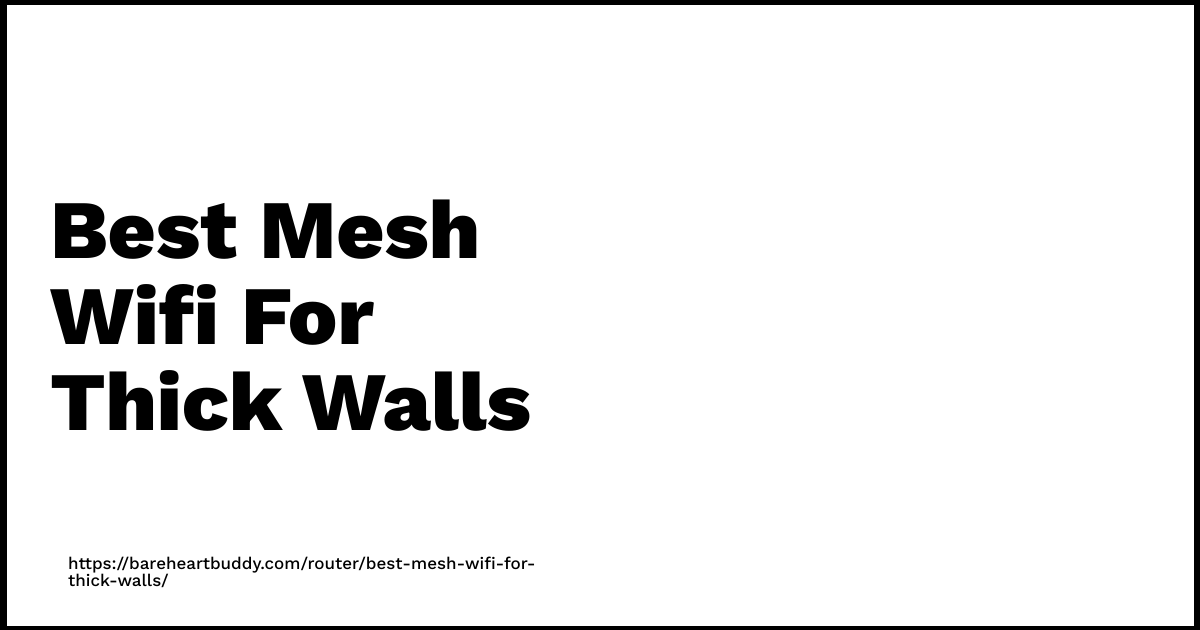
:no_upscale()/cdn.vox-cdn.com/uploads/chorus_asset/file/22170471/dseifert_201213_4337_0005.jpg)